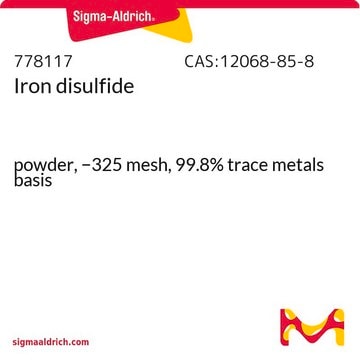244627
Zinc sulfide
powder, 10 μm, 99.99% trace metals basis
Synonym(s):
Zinc sulphide
Sign Into View Organizational & Contract Pricing
All Photos(2)
About This Item
Linear Formula:
ZnS
CAS Number:
Molecular Weight:
97.46
EC Number:
MDL number:
UNSPSC Code:
12161600
eCl@ss:
38150412
PubChem Substance ID:
NACRES:
NA.22
Recommended Products
Assay
99.99% trace metals basis
form
powder
reaction suitability
core: zinc
reagent type: catalyst
particle size
10 μm
density
4.1 g/mL at 25 °C (lit.)
SMILES string
S=[Zn]
InChI
1S/S.Zn
InChI key
WGPCGCOKHWGKJJ-UHFFFAOYSA-N
Looking for similar products? Visit Product Comparison Guide
Application
Uses:
- Preparation of flexible transparent conductive coatings essential for fabrication of a variety of printed electronic devices such as flexible displays and solar cells
- Prepare a composite CdS-ZnS/Zirconium-titanium phosphate (ZTP) photocatalyst for hydrogen production under visible light
- Prepare light-controlled bioelectrochemical sensors based on CdSe/ZnS quantum dots
- Catalyst for photocatalytic degradation of organic pollutants
- Preparation of color tunable light-emitting diodes (LEDs)
- Prepare (CdS-ZnS)-TiO2 combined photocatalysts for electricity production via photoelectrocatalysis
- Catalyst for synthesis of spirooxindole derivatives in aqueous medium via Knoevenagel condensation followed by Michael addition
- Prepare CdSe/ZnS q uantum dots for chemiluminescent and chemiluminescence resonance energy transfer (CRET) detection of DNA, metal ions, and aptamer-substrate complexes
- Preparation of ZnS nanocrystals for ultrasensitive protein detection in terms of multiphonon resonance Raman scattering
Zinc sulfide can be used:
- To prepare flexible transparent conductive coatings essential for fabrication of a variety of printed electronic devices such as flexible displays and solar cells.
- To prepare a composite CdS-ZnS/zirconium-titanium phosphate (ZTP) photocatalyst for hydrogen production under visible light.
- To prepare light-controlled bioelectrochemical sensors based on CdSe/ZnS quantum dots.
- As a catalyst for the photocatalytic degradation of organic pollutants.
- In the preparation of color tunable light-emitting diodes (LEDs).
- To prepare (CdS-ZnS)-TiO2 combined photocatalysts for electricity production via photoelectrocatalysis.
- As a catalyst for the synthesis of spirooxindole derivatives in aqueous medium via Knoevenagel condensation followed by Michael addition.
- To prepare CdSe/ZnS quantum dots for chemiluminescent and chemiluminescence resonance energy transfer (CRET) detection of DNA, metal ions, and aptamer-substrate complexes.
- To prepare ZnS nanocrystals for ultrasensitive protein detection in terms of multiphonon resonance Raman scattering.
Storage Class Code
13 - Non Combustible Solids
WGK
nwg
Flash Point(F)
Not applicable
Flash Point(C)
Not applicable
Personal Protective Equipment
dust mask type N95 (US), Eyeshields, Gloves
Certificates of Analysis (COA)
Search for Certificates of Analysis (COA) by entering the products Lot/Batch Number. Lot and Batch Numbers can be found on a product’s label following the words ‘Lot’ or ‘Batch’.
Already Own This Product?
Find documentation for the products that you have recently purchased in the Document Library.
Customers Also Viewed
Flexible transparent conductive coatings by combining self-assembly with sintering of silver nanoparticles performed at room temperature.
Layani M and Magdassi S
Journal of Materials Chemistry, 21(39), 15378-15382 (2011)
Ultrasensitive protein detection in terms of multiphonon resonance Raman scattering in ZnS nanocrystals.
Chu X, et al.
Applied Physics Letters, 98(25), 253703-253703 (2011)
Photocatalysis and photoelectrocatalysis using (CdS-ZnS)/TiO2 combined photocatalysts.
Antoniadou M, et al.
Applied Catalysis. B, Environmental, 107(1-2), 188-196 (2011)
Efficient hydrogen production by composite photocatalyst CdS?ZnS/Zirconium?titanium phosphate (ZTP) under visible light illumination.
Biswal N, et al.
International Journal of Hydrogen Energy, 36(21), 13452-13460 (2011)
Visible-light absorptivity of a zincoxysulfide (ZnOxS1? x) composite semiconductor and its photocatalytic activities for degradation of organic pollutants under visible-light irradiation.
Kim C, et al.
Applied Catalysis A: General, 330, 127-133 (2007)
Our team of scientists has experience in all areas of research including Life Science, Material Science, Chemical Synthesis, Chromatography, Analytical and many others.
Contact Technical Service







